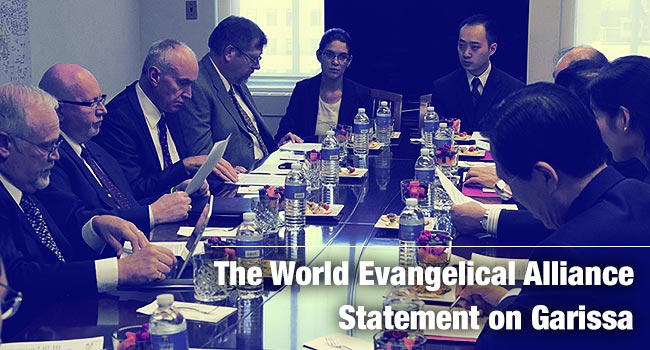The World Evangelical Alliance Statement on Garissa

STATEMENT OF THE RELIGOUS LIBERTY COMMISSION OF THE WORLD EVANGELICAL ALLIANCE
Let's Eradicate Terrorism in Response to Killing of Christian Students in Kenya
We condemn the cowardly, senseless, inhuman, targeted killing of innocent Christian students at Kenya's Garissa University College by masked gunmen from the Al-Shabaab terror group this week. But let's not stop there, and see this attack as the last straw.
We were at a loss of words as we heard the news of attackers with explosives and AK-47s targeting a campus site where Christians had gone to pray on Thursday. This deep sorrow should now impel us to defeat terrorism in Africa, the Middle East and elsewhere.
"We cannot look at terrorism in isolation, be it Kenya or Somalia or Iraq or Syria," WEA-RLC Executive Director Godfrey Yogarajah said. "Al-Shabaab, which claimed responsibility for the shameless killing, as well as groups like al-Qaeda, Islamic State (ISIS) and Boko Haram are transnational terror groups or aspire to become one, and appear to be either cooperating or competing with each other in revealing their evil intent."
Kenya shares a long, porous border (435 miles) with Somalia and has long suffered from instability in its neighborhood. Kenya also has several coastal towns, which can facilitate movements of terrorists from Somalia. Al-Shabaab controls southern parts of Somalia, where the common border exists.
Al Shabaab has a Kenyan affiliate, called al Hijra, which exploits perceptions among sections of Muslims about their marginalization by the primarily Christian administration of President Uhuru Kenyatta.
Al-Shabaab has been seeking to retaliate for Kenya's decision to send troops to Somalia in 2011 to fight the terror group. It is estimated that Al-Shabaab killed at least 400 people and injured over 1,000 in more than 100 attacks between 2011 and 2014.
The same terror group also attacked Nairobi's Westgate Mall on Sept. 21, 2013, leaving at least 68 dead and 175 wounded. This week's attack was even more brutal.
"It's an unfortunate race among terror groups to cause destruction of human lives to maintain their relevance at a time when ISIS is causing unprecedented bloodshed. This trend demands that the international coalition fighting ISIS in Iraq and Syria should expand their mission to include other terror groups as their targets – of course, not with airstrikes or troops on the ground," Yogarajah added. "World leaders should join hands to defeat terrorism by cooperating with each other and treating the end of terrorism in every country as a common objective."
The United States gives millions of dollars as military and financial aid to Kenya to help fight terrorism, and can, therefore, have a say in how Kenya counters the threat from Al-Shabaab. And Kenya seems to be going the wrong way.
Kenya must be told to make changes in its counterterrorism strategy, which currently appears to be mere pursuit of heavy-handedness. The alleged targeting civil society, curbing civil freedoms, extra-judicial killings and abductions and random raids in Muslim areas will not only not help, but may also make the country a fertile ground for radicalization and recruitment for terror groups.
"The international community and world leaders working towards peace and stability in all terror-torn regions and helping governments fight all terror groups could be the best way forward," Yogarajah said.
"We, as Christians, believe in the power of prayer, and we must be on our knees for the victims and survivors and the governments and the international organizations that are committed to sincerely help eradicate terrorism."
For further information please contact Godfrey Yogarajah, Executive Director, at
This email address is being protected from spambots. You need JavaScript enabled to view it.
, or visit http://www.worldevangelicals.
The Religious Liberty Commission is monitoring the religious liberty situation in more than 100 nations, defending persecuted Christians, informing the global church, challenging the Church to pray ( www.idop.org ) and giving all possible assistance to those who are suffering. The Commission also makes fact-finding trips and meets with governments and ambassadors speaking up for the suffering brothers and sisters. At the United Nations, the Commission reports about the situation and arranges special hearings with Christians from countries under pressure.


